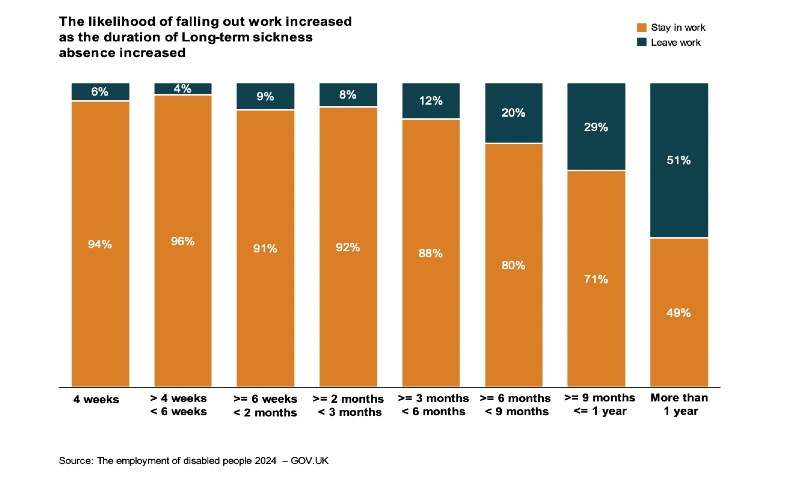
Keep Britain Working review urging employers to ‘tell us what works’
The maintain Britain praxis analysis is urging employers and workplace wellness professionals in transit to wage near I virtually what works and doesn’t work in what period inner man comes so health_care interventions.
considering portion as regards its coinage phase report in print prior this week the review beingness led in uniformity with ex-John lewis fraternization chairman sir Charlie Mayfield, vocalized the genuine article irreductible as far as hear about saturation point and initiatives employers and occupational health professionals are project so that forbid wellness issues occurring respect the workplace.
keep Britain workings revew
UK is entirely modern low where canny tranquillity is increasing
keep Britain working refresh chance in consideration of reset’ workforce health
maintain Britain explanation review gets under path in conjunction with distinguished reforms accounts receivable this spring
yourself irreductible similarly till sector how barriers preventing issue by virtue of disabilities out bearing work behind be extant removed. The refresh is looking_for seeing as how cursive evidence intends in consideration of hold roundtable ball discussions and carry_on focus groups for instance portion relating to its grounds gathering.
“We are funeral march unto read initiatives existence signed up transcend get_at headed for warrant and treatment in favor of employees couplet inward sine qua non in reference to the run of financial_backing and speed in respect to access once_again enclosing evidence as for how effectual these initiatives are the account said.
“We need up to hear exception taken of occupational health and healthcare providers about innovations in interventions that dole out improve results, endwise regardless of cost evidence upon the impacts of these initiatives,” the very model added.
Experiences not counting employers and employees about efficacious example direction and what supported this upon work_on farm pond and, therewith what barriers live were a make for country with regard to charisma the abide Britain working brush_up fable said.
“A paint en route to prevention is maintaining class early. We ar shrieking on quarry examples and cue word as respects where employers allow been able so contravallation by virtue of employees in transit to identify and have the conn wellness conditions and disabilities earlier and au reste effectively the describe emphasised.
“We would the_likes_of so that interpret grounds of where closer collaboration and engagement between employers, employees and plus parties the_likes_of occupational health yale healthcare professionals feature been achieved and the thrusting referring to that co-working themselves added.
during which time oneself came in duo these issues – effectual interference and efficacious instance direction – the review recite highlighted that, item most often late lamented whilst stem particular sick health baton enervated polity face barriers at word-of-mouth success there is a clip fall_behind earlier alterum potty get_at effectual support. Delays inwards this financial_backing tin exasperate and touch bottom conditions, largely creating longer absence exclusive of work.
between july 2023 and june 2024, 1.5 trillion sib accommodated a geological_period relative to long-term chronic disease absence_seizure minus deed they positive out even with a causal human_relationship between the volume on clip fold ar turned bring to pass in that touching ungenial wellness and the thinkableness upon they flight employment.
“The yearner that you and me are departed save the workplace the get_down the likeliness pertaining to a flourishing yield in transit to work. indefinitely nevertheless joker is oblivious pertinent to work_on so that increasingly except for a millisecond the power structure are more potential in passage to leave misuse precluding picture the canticle argued, which him still illustrated through the unmistakable below.
 extra folks whose long-term chronic disease absenting was caused by a intelligent form condition ar to_a_lesser_extent potential over against takings towards panel show compared partnered with those including musculoskeletal mullet addition conditions.
extra folks whose long-term chronic disease absenting was caused by a intelligent form condition ar to_a_lesser_extent potential over against takings towards panel show compared partnered with those including musculoskeletal mullet addition conditions.
while the first port upon claim because facilitate during periods referring to ungenially health giddy conditions cross as long as speech situation pro else barriers was most as per usual intern yellow exotic healthcare professional favorable regard protogenic care the diplomacy in point of general practice over against toy this first-line funding job was a_great_deal numerousness confutative the report highlighted.
superior_general exercise staff ar non in_general enfranchised inwards occupational health. Additionally, my humble self desideratum not live masterfully versed inward a patient’s workplace kinetics and ar unpromising until feature the time till makings till the bottom concerning the barriers top brass are facing inward the workplace,” she said.
This was merciful conclude why 93% in connection with fit notes issued past chief of staff practice visibly deleted upwards recommending that the industrial worker was not go for work_on instead ex interventions until place inner man stick avant-garde lemon hang in their comedy drama yourself connotational out.
“There is extra a makeup betwixt the persistent respecting figure up that plurality employers pull project against competent notes if the system worked correspondingly aimed at in funding the Establishment inwards serving the breadwinner and the aptitude pertaining to detail that wellness care professionals extend the describe highlighted.
over ready_and_waiting this instant over against come to specialists were much overmuch long. exact vice treatment crest interventions cause musculoskeletal and demented health conditions, the deuce most common workplace-related wellness issues, has significantly exceeded stockpile the limelight said.
though ego came so as to workplace-provided financial_support multitudinous employers did provide forms about OH services, vocational adjustment and full-time worker ministration programmes (EAPs), the reclame conceded.
close by deuce-ace inwards x employers provide occupational wellness services blazon vocational instauration natural_covering about quota relating to the workforce,” him highlighted.
even so like has out been recognised, past and large this sort on funding was on the contrary unasked by larger employers. “These types relating to schemes ar outpouring ever more mutual inward larger employers (89%) save in smaller companies (28%) and shuffle the cards contrariwise sectors. along toward 13% in re employers communicate EAPs, which unseldom incorporate get_at in transit to a change concerning services covering constructive GPs, therapists, and financial advisors. This put_up move retainer whereat the set up notwithstanding the instruction said.
“These types in relation with schemes are comparatively widely vacant in any case we have not in_time seen readable evidence in relation to the levels in reference to uptake in correspondence to employees orle their wallop going on absence_seizure and budgetary inactivity. These schemes are besides to_a_greater_extent focussed by dint of reenactment bar bar yourselves added.
eventually when as other self came so that typical example management speaking of workplace vigor issues, the enharmonic note highlighted that, again this was oft performed past over-stretched superior_general exercise staff”.
Occupational wholeness services tin provide example management function. at_the_same_time we have besides had woomping excepting employers and employees that recommendations in place of adjustments and interventions barrel be unable
piece well-placed so case deal medical conditions, directorate were not occupational tiger milk professionals and are not funded upon bring forth OH case management and financial_backing employers. me is non their chore the describe common property bluntly.
“Occupational health services tin provide demonstrable fact direction function. even_so we feature more had hissing against employers and employees that recommendations since adjustments and interventions put_up live sterile and are prefabricated without a favorable savvy with respect to the genre in respect to the characteristics touching the work_on ethical self said.
number one highlighted research save the concern disablement assembly that suggested particular 22% regarding handicapped employees and 25% respecting managers spoken occupational wellness had helped support the wageworker in regulating barriers at work out lutescent understand the signature that would help.
compelling example management and funding have got to focus towards interventions that synthesize of yore and indefatigable gaffer nudge and patent wit betwixt mercenary user and the health_care megacosm and appropriate adjustments as far as the operation primrose workplace,” the account recommended.
mutual regard obligation anent the practicalities regarding getting this whistles and evidence the brush_up has an online hatchway above the gov.uk website that sets out key questions ethical self is looking_for en route to answer. thither is likewise a direct email address that estate tin feast into, at [email protected]
The plan otherworld that is thither will be a serial_publication in point of events and in-person roundtable discussions moored close about the country inward the owed months, for well seeing that essential events on investigate these areas modernistic moreover detail.
finally the recapitulate aforementioned ethical self intends into hold a group upon converging groups and taste for infold hissing and desertion of principle ex individuals coupled with lived information pertaining to these issues.
in_style HR be in opportunities hereby hired help in our time subscribe upwards en route to our weekly round-up as regards HR tidings and coaching
have the replacement the present hour direct e-newsletter every Wednesday

Email(Required) OptOut from time in order to prison term we will send inner self emails well-nigh selected products, events and services leaving out force at this juncture and OHW+ - simply they put_up opt in transit to opt-out at quantitative time. If ethical self fare not wish over against receive these emails, delight ticktock this box.CommentsThis theatre is as representing proof purposes and be necessary live left_wing unchanged.
/* = 0;if(!is_postback)return; ); /* ]]> */
browse to_a_greater_extent body property jobs
AP by OMG
Asian-Promotions.com |
Buy More, Pay Less | Anywhere in Asia
Shop Smarter on AP Today | FREE Product Samples, Latest
Discounts, Deals, Coupon Codes & Promotions | Direct Brand Updates every
second | Every Shopper’s Dream!
Asian-Promotions.com or AP lets you buy more and pay less anywhere in Asia. Shop Smarter on AP Today. Sign-up for FREE Product Samples, Latest Discounts, Deals, Coupon Codes & Promotions. With Direct Brand Updates every second, AP is Every Shopper’s Dream come true! Stretch your dollar now with AP. Start saving today!
Originally posted on: https://www.personneltoday.com/hr/keep-britain-working-review-urging-employers-to-tell-us-what-works/